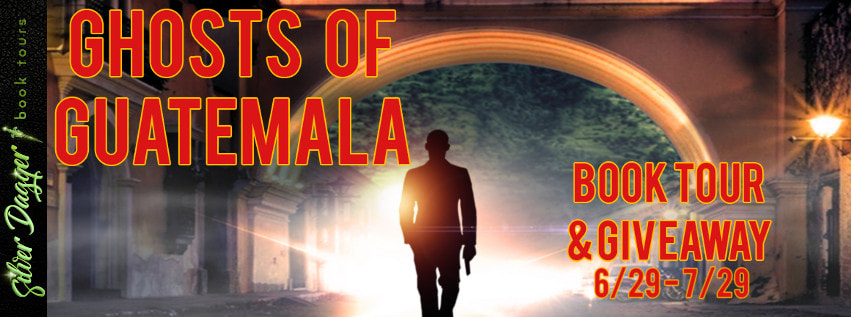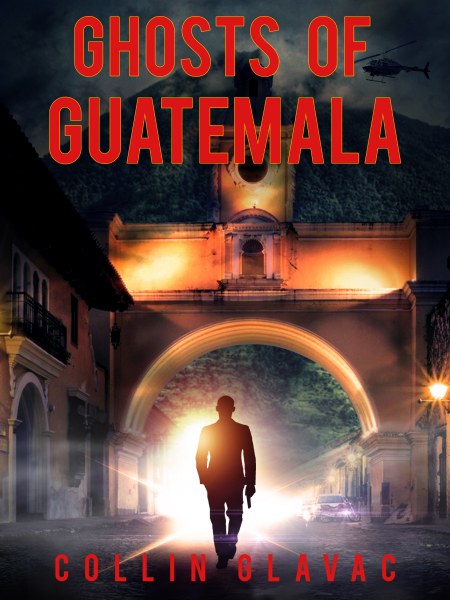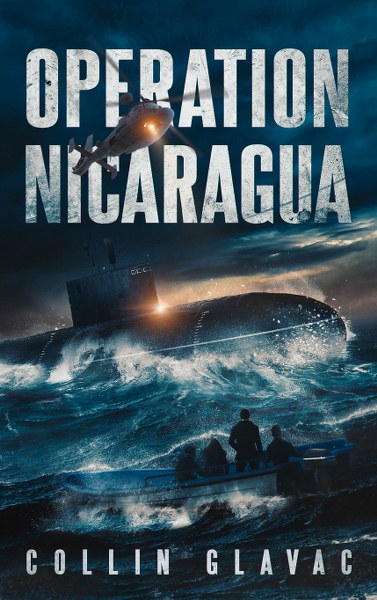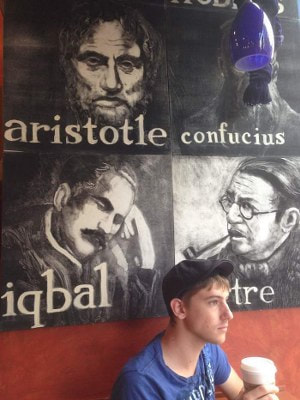Ghosts of Guatemala (John Carpenter Trilogy ) Spy Thriller by Collin Glavac ➱ Book Tour with Giveaway
Ghosts of Guatemala
Prologue
Black
operative John Carpenter can’t forget his last mission. After uncovering
brokered deals between a Guatemalan cartel and the CIA, John searches for the
truth while going behind the back of his handler. At the same time, John is
ordered to get a Silicon Valley millionaire out of Nicaragua amidst student
riots and deadly paramilitary. He needs all of his ingenuity and training to
get the asset – and himself – out alive.
He
managed not to moan – he was a professional even in the worst situations – but
he couldn’t stop himself from hyperventilating. He was in shock. He knew he was
in shock. He tried to kick it. Clear his mind, focus on the task at hand. He’d
been shot. He needed to eliminate the threat. He had to finish the mission.
The
searing pain was beginning to drip into his system now, a slow whine that
overtook his adrenaline and as his pain tolerance started to be overwhelmed, he
wanted to cry out, desperate for reprieve.
There
was no one here to help him. If a mission went wrong, if someone was captured
or killed, there would be no rescue. That’s how The Firm’s agent’s operated.
That was how they kept the United States government far away from any political
fallout. And besides, they never made mistakes.
Brian
crawled painfully to cover, feeling blood smear against shards of glass against
the floor. He pressed a hand to his chest, not bothering to look at how bad the
wound was. He didn’t need to look at it. He knew what that kind of bloodflow
through his gloves meant. He managed to pull himself next to a cabinet, leaning
his back against the wood and tried to calm his breath. His sigh turned into a
cough. He raised his other hand instinctively to cover his mouth and he found
he hadn’t dropped his gun when he’d fallen. He held the reliable Beretta in
white knuckled fingers that refused to let go, shaking from the effort of his
training that refused to abandon him against all odds.
He
looked down at the glass. Some of it had been decorated with a metal coating.
He placed his gun in his lap and retrieved a large piece, angling it to see
where his attacker was hiding. It was dark and his vision was beginning to
blur. His thoughts began to wander.
It
wasn’t supposed to be like this. It was supposed to be a simple hit. Kill the head
of an Antiguan drug cartel. Snatch some information off a computer while he was
at it. An upper level operative had confided in him that something was wrong
with this cartel. Something about corruption. Something way above petty drug
wars and trafficking operations.
He
had slipped past security. Gotten into the estate. His target should have been
here, caught unawares. A silent chuckle escaped him. Had he gotten that rusty?
He coughed up blood.
As
if to answer his unspoken questions, a figure emerged from the darkness. Brian
watched it through the mirrored glass, but it was getting increasingly
difficult to concentrate. The man was a large figure; imposing, he held a
handgun and even as his consciousness ebbed and flowed, Brian couldn’t help but
admire what a well-tailored suit he was wearing. He always tried to be an
optimist. The man continued to walk toward Brian’s hiding place, waving the
handgun as he spoke. His low voice pierced the darkness.
“Looks
like my deal is better than your deal, mamón. I almost feel bad. But business
is business.”
That
was his target, no doubt about it. Sandor Puentes. But Brian didn’t understand
what the man was saying. He couldn’t piece anything together. His mind was a
fog. In his final moments, bleeding out, desperately attempting to complete at
least part of his mission, Brian thought of his best friend John Carpenter, and
the painstaking Spanish lesson he’d received. He’d wanted to master at least
one good swear word.
“Que
te folle un pez!” Brian cried, bursting from behind the cabinet and preparing
to unload his magazine into Sandor Puentes, brutal cartel boss of Antigua,
probably one of the largest sex traffickers in all of Latin America. I hope you
get fucked by a fish!
All
people deserved justice. Some people’s justice was death.
Gunshots
tore through the air like vengeance.
“In
here!” Juan Puentes yelled to the guards. Where were the guards?
He
had heard his mother and father yelling, and gunshots. The deals they had made
with the other cartels were holding strong. Who could be attacking them? His
heart pounded in his chest, his soul itched for battle. If there was trouble,
he would protect his family. He clutched his shotgun and bounded into the foyer
where he was sure the commotion was. Guards flooded the room alongside him,
some shining flashlights. Idiotas, Juan thought, pushing a guard out of the
way. He flicked on the light switch, turning on the lavish electric chandelier.
Pablo
and Isabella, his uncle and mother were in the room, holding each other, shaking
and weeping. Juan stared at them in shock. His eyes drifted over to his
father’s desk, and he saw a handgun resting idly there. He was hardly aware of
anything else until his uncle spoke and pointed near the door.
“I’m
sorry, sobrino. Nephew. Truly, I am.”
A
man dressed all in black laid in a bloody heap on the floor. Blood and broken
glass were everywhere. Juan didn’t understand.
“I suppose it is not sobrino, anymore, mi hijo,” Pablo’s words hung, foreign in
Juan’s ears. My son.
It
was then that Juan saw.
Sandor
Puentes, his strong and determined father – his loving father – lay beside the
other man, his forehead blown apart, mouth twisted in a sneer.
Juan
let out a wail, overwhelmed by the sight of his father, firing his shotgun into
the air. The ornate chandelier exploded in a shower of glass and crystal. Its
shattered remains fell all around him as darkness covered the room once more.
Operation Nicaragua
Prologue
Aaron
Miles didn’t know that he was going to die today.
He
did know, however, that the information he’d stolen was the most volatile he’d
ever delivered. Snatching it from under the noses of Cuban intelligence might
be praiseworthy, but Aaron could only care about not getting caught. The first
twenty-four hours of espionage operations were the most crucial and the most
vulnerable time for spies. He checked his watch.
“This
is it?” his compatriot asked, looking at the sheet of information he’d been
given. Aaron didn’t know his name. He didn’t know Aaron’s. It was best that
way.
“It’s
enough,” said Aaron in a low tone, repressing the urge to look over his
shoulder. He’d been doing this job long enough to know the best way to get
caught was acting suspicious.
“It’s
a single page – where’s the rest?”
Aaron
hunkered down in his booth and gestured for the man to keep quiet. They had
elected to meet at the Nostrovia. It was the only retro-Soviet restaurant in
Havana and the designated share-point for Russians in his spy network.
A
server walked by. Neither of the agents spoke until she passed.
“That’s
all I could get.”
The
other agent didn’t reply.
“I’ve
been here too long already,” Aaron said quietly. “I have to go.”
The
other agent nodded reluctantly, but there was nothing more to say. Aaron looked
out the window to admire Cuba’s pastel buildings, but found his eyes lingering
onto others crumbling with their scaffolding exposed to the street. The slums
sat next to such beautiful buildings, most split in two so families could live
one atop the other. Poverty was no secret here.
Aaron
downed his drink in one go, left American dollar bills for payment, and got up
to leave. He watched the other man tuck the delicate paper into a pocket before
being satisfied enough to walk out the door.
The
afternoon was hot but Aaron felt a chill. He tucked his hands in his suit
jacket pockets and decided on a brisk pace, one not so quick as to bring
attention, but not so slow to make him linger.
He
had to get to the American embassy. This last piece of intel had finally fallen
into place. He had solved the puzzle. What lay before him was something so
destructive, he could hardly believe it existed. Once at the American embassy,
he could count his mission as a success, and some of the burden would pass on.
He’d be able to finally rest easy.
He
fell into step along the Malecón, the famous and beautiful walkway and seawall
that stretched along Havana Cuba’s coast. It passed through the three
neighborhoods of Havana and was known as its ‘living room.’ In the evening, the
Cubanos would come out to watch the sunset or to drink and dance. Aaron had a
feeling that he wouldn’t be enjoying the sunset from the Malecón that evening.
After
a few minutes of wary walking, he stripped his jacket and turned to face the
coast, allowing himself to do a discreet one-eighty to make sure he wasn’t
being followed. But Aaron’s only company along the Malecón were the fishermen
standing on the seawall, and the seagulls screaming to one another. He threw
his jacket over his shoulder and walked past two fishermen laughing and
untangling themselves from seaweed that had blown over the wall with a crashing
wave. He found himself staring at the fishermen. Had he ever been so carefree?
He wondered if he’d ever have that luxury again. Another wave crashed over the
seawall and the salty spray grazed him, breaking him from his reverie and
urging him onward.
Although
he was in a hurry he had decided not to take a cab from the restaurant. If he
were being watched or tailed, surely counter-intelligence would send their own
agent to pick him up in a car, and he would have no way of knowing and no way
out. He was left to watch the old nineteen-fifties and sixties cars roll by
instead. Cuba seemed to be a land lost in time. America’s embargo on new cars
meant that bright and pastel colored Fords, Chevys, Buicks, Dodges, Plymouths,
and Studebakers cruised down the modern six-lane highway. Cuba brought in
Chinese and Russian cars now, but pride still rested on American oldies which
were painstakingly maintained. Off to his left down a dark alley, Aaron could
see one of the many ‘cannibalized cars’ left stripped on the curb, its parts
taken to make more precious antique cars run. A whole industry had emerged.
Cuban locals, who made twenty-five dollars a month could now charge fifty
dollars an hour to take foreign tourists for a spin in their vintage car.
The
Malecón was lined with monuments, each telling a part of the history and
culture of Cuba. He walked past them as they sprung up along his route, like
beacons leading him toward the embassy. He paused at the monument dedicated to
the crew of the USS Maine. It was a long wedge-shaped structure with two tall
pillars protruding from the center; all in blinding white marble. He gave
himself a second one-eighty look around as he circled the statue.
‘Remember
the Maine! To hell with Spain!’ Aaron whispered with a chuckle. It was the old
adage during the Spanish-American war. Americans had sent the USS Maine to
Havana Harbor during the Cuban war of independence and she sank. Back when
Cubans liked America, he thought.
To
this day many Cubans thought the Americans sank their own ship as an excuse for
war.
Wouldn’t
be the last time they did that, Aaron smiled ruefully, and continued on his
way.
Cuba
had been the victim of three wrestling superpowers. Each time the island was
‘liberated’ they seemed to find themselves under a new thumb. Spain, America,
and the Soviet Union had all treated Cuba as a colony-prize, to be taken and
controlled. He was certain that sentiment contributed to what he’d uncovered in
the Dirección de Inteligencia. But that would have to wait.
He
was nearly there. As he grew closer to the Vedano neighborhood and the embassy
he saw the Hotel Nacional de Cuba looking down on him from Taganana Hill. It
was a building that held many secrets. Fidel Castro and Che Guevara had led the
defense of Havana during the 1962 Cuban Missile Crisis from a series of tunnels
and bunkers sprawling under the complex. Aaron hoped they would never be used
again.
He
crossed the Plaza de la Dignidad toward the José Martí Anti-Imperialist
Platform. The American embassy came into view, obstructed by dozens of
flagpoles flying black flags. A gust of wind picked up from the ocean and sent
the flags into a frenzy. Aaron looked up at the ominous sound of flapping
fabrics.
The
sound of a silenced pistol shot interrupted his thoughts.
Aaron’s
eyes grew wide with surprise and then with realization. He brought a hand to the
bullet wound in his chest. He hadn’t seen who had shot him. Aaron only had a
moment to lay eyes on the embassy before collapsing to his knees, then the
ground. His final struggling breath disappeared on the turbulent ocean winds.
“Filthy
American,” the Cuban agent whispered, chewing on a toothpick and tossing it to
the ground. The Cuban was dressed as an American tourist. He raised the camera
hanging from his neck and snapped a picture of the agent’s body. He looked over
his shoulder in the direction of the American embassy and gave the building a
dark look before moving away from the scene. He had known Aaron Miles was a spy
working in Cuba. But he didn’t know what information the spy was on his way to
deliver at the American embassy. That didn’t matter to him. This was only the
beginning.
He
placed a call as he moved.
“Sí?” came the reply.
“It
is done.”
“Good.
Now we need to talk to the other American.”
The
Cuban grinned. “Barry Bridges. Take care amigo.” He hung up and casually
retraced Aaron’s steps along the Malecón.
The
Cuban had gotten one thing wrong. Aaron Miles was a spy, but he wasn’t
American. There was no way to learn that now, and it made all the difference.











Thank you very much for posting blurbs and excerpts from my son's debut spy thriller Ghosts of Guatemala and his second book in the John Carpenter series Operation Nicaragua. It's very much appreciated.
ReplyDeleteAll the best,
Marjan Glavac A Proud Dad